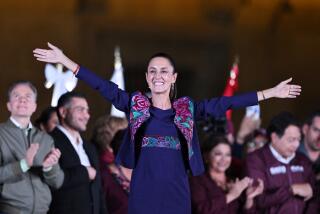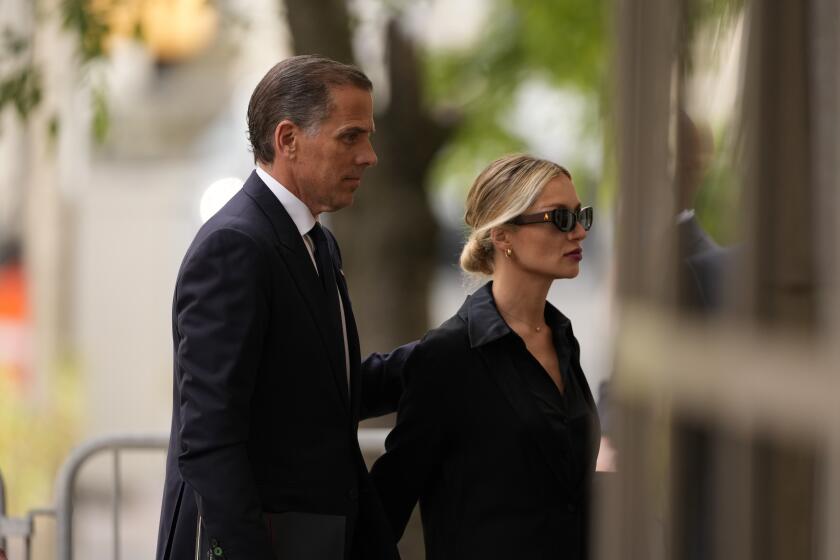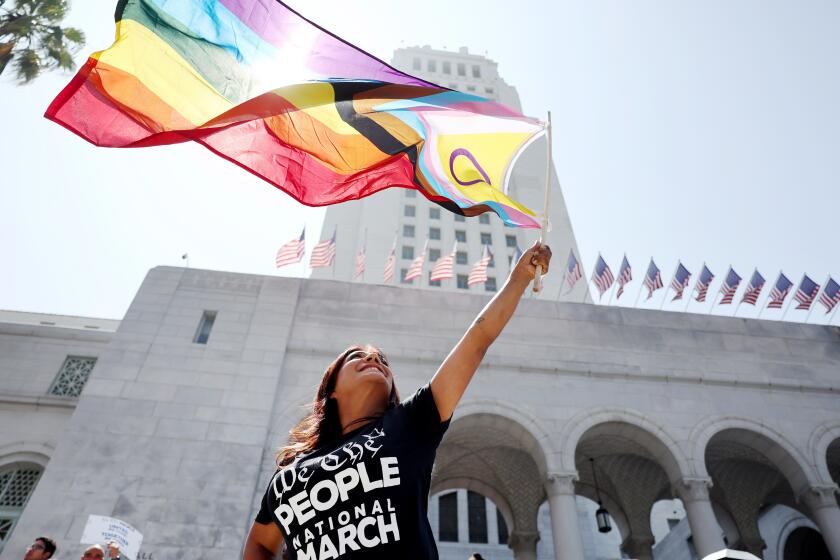To Free a Spy’s Wife : It’s Bernard Henderson’s Most Difficult Selling Job: Building Sympathy for His Jailed Daughter
The telephone calls come at least once a day to the drab office suite inside an anonymous high-rise building at the edge of Manhattan’s garment district. For Bernard Henderson, the man at the receiving end, they are at once intensely personal and strictly business.
The caller is his daughter, Anne Henderson-Pollard, wife of Jonathan Jay Pollard, the former U.S. Navy intelligence analyst convicted of spying for Israel and sentenced a year ago to life imprisonment. She dials each day from a federal prison hospital in Rochester, Minn., where she, too, is serving time--a five-year term for aiding her husband.
As father and daughter speak, a prison tape recorder runs. Government monitors regularly listen in.
Their talks touch on trivial matters--greetings from friends, a cousin’s latest art show, the prison’s faulty air-conditioning system. But at the heart of every conversation is the difficult business of getting the Pollards out of jail.
Heads Lobbying Effort
Over the last year, Henderson, a veteran New York public relations man whose clients have included Teamsters and motor oil makers, has become the linchpin of a campaign that most seasoned publicity hands would shun. Bolstered by a network of loyalists and aided by prominent civil libertarian brothers Alan and Nathan Dershowitz, Henderson heads a lobbying effort aimed at freeing his daughter and reducing Pollard’s prison term.
It is a monumental task. The Pollards’ notoriety, their guilty pleas and steadfast allegiance to Israel--coupled with the U.S. government’s insistence that spies should be dealt with harshly--have made them remote and unsympathetic figures during a period of escalating public concern about espionage.
But the movement appears to be reviving interest in the Pollard affair, a sensitive issue that vexed American Jews for months after the couple’s arrest three years ago. Claiming thousands of petition signatures for the couple’s freedom and planning rallies in New York, Los Angeles and other major cities, supporters have made inroads among Orthodox Jews and ardent Zionists. The affair is also provoking renewed discussion among mainstream Jewish leaders, whose worries about questions of loyalty still prompt many to condemn the Pollards for placing Israeli interests above American security.
Pollard supporters portray the couple as American Dreyfuses, victims of vendetta and government-sanctioned anti-Semitism. They allege that Anne Henderson-Pollard, 27, has grown dangerously ill in prison because of poor medical treatment by authorities. Her husband, 32, who is being held in a protective cell at the nation’s highest-security prison in Marion, Ill., went on a four-day hunger strike last week to protest her condition.
Health Issue Clouded
Federal officials acknowledge Henderson-Pollard’s illness, but describe her treatment as exemplary. The health issue has been clouded by her isolation in the prison hospital where she undergoes weekly tests.
Authorities also dismiss talk of anti-Semitism. But national Jewish leaders are nervous about its use by the Pollards’ supporters, fearing the charge is becoming, as one rabbi said, “an automatic response.”
After a year of virtual silence, the fact that the American Jewish community is again rehashing the Pollard affair is taken by Bernard Henderson as no small victory. His optimism appears fashioned from a P.R. man’s bravado and a father’s earnest devotion. But midway through a well-rehearsed recitation of the VIPs he has buttonholed for the cause, his eyes suddenly moisten.
“It’s been tough getting people to listen,” he said. “Sometimes, you want to just let it all out, but you have to take your emotions and pull back.”
Portly and harried, Henderson, 54, wears weariness like a bad suit. His hair has grayed considerably since his daughter’s arrest. His eyelids are pouches. He devours Kools, breathing loudly in smoker’s gasps. On weekends, he often works the phones and fax machine in his office, sleeping fitfully on an old sofa.
News releases have to get out. Calls must be fielded. He is constantly short copies of “A Spy’s Story,” the book he wrote last year to vindicate the Pollards and defray their legal expenses. And he must always stay on top of things for his daughter. During calls, she peppers her father with advice, eager for new signs of support.
“We’ve got the rally tonight,” he tells her during one conversation. “I got a letter from another prison friend of yours. . . . Yeah, I’ll talk to the attorney. . . . By the way, I was on the radio this morning in Florida. . . .”
Like her father, Anne Henderson-Pollard knows the value of publicity. When she was arrested in the Washington apartment she shared with her husband on Nov. 22, 1985, she was working as a public relations consultant.
“She really had a knack for the business,” said Henderson, an Idahoan of Scottish-Irish Protestant extraction who started out as a mine engineer. He and his wife, Elaine, from a New York Jewish family, raised their daughter in a New Jersey suburb. “Anne was a model child,” he recalls. “She always had a happy disposition. Her school work was nothing but straight A’s. Discipline with Anne was simply saying, ‘Anne, don’t do that.’ ”
When his marriage dissolved in the late 1970s, Henderson took his daughter to Washington, where he was press secretary for the Teamsters for several years. After finishing high school, Anne Henderson-Pollard worked as a secretary, then as a publicist for the National Rifle Assn.
She showed little interest in Judaism or Israel until 1981, when she met Pollard, who had been assigned to Washington as an analyst with the Navy’s anti-terrorism unit after graduating from Stanford. Pollard was a voracious reader whose apartment was stacked with more than 1,000 books. He was also a passionate Zionist, son of an Indiana microbiologist whose Lithuanian family was nearly wiped out in Nazi concentration camps.
After living together for several years, the Pollards were married in August, 1985, during a European trip. (Prosecutors later claimed it was partly underwritten by Israel for Pollard’s spy activities.) Anne Henderson-Pollard had by then adopted her husband’s staunchly pro-Israel views. “Anne became devoted through Jonathan,” said Philip Landa, a friend of hers from New York who came to admire Pollard. “They are both very bright intellectually and as she learned, she was moved.”
Three months after their wedding, the Pollards were in jail. Prosecutors said Pollard had done “grave damage” to U.S. security. He was accused of stealing more than 1,000 classified documents--mostly analytical studies and satellite photographs--and of delivering them to Israel in return for at least $45,000 in cash and other favors. Though not charged with spying, Anne Henderson-Pollard was charged with hiding a suitcase stuffed with stolen documents and with using other embezzled papers to help her publicity business.
The couple pleaded guilty--Pollard, to a count of conspiring to deliver military information to Israel, his wife to lesser charges of being an accessory “after the fact” and conspiracy to receive embezzled government property. In March, 1987, a federal judge sentenced Pollard to a life term without parole. Anne Henderson-Pollard was given two 5-year terms to be served concurrently. She is eligible for parole after 46 months.
Plea Bargaining
Henderson and other relatives had urged the couple to accept a plea bargain agreement with prosecutors. In return, they expected leniency. When the maximum sentences were handed down, Henderson was devastated.
“She is being punished because she loves her husband and she stood by him,” he said. “My daughter was convicted of something that millions of people in this country are guilty of--standing by their loved ones.”
The “Justice for the Pollards” movement began from those seeds of despair. But it did not get off to a rousing start. The American Jewish community, the most obvious group for Henderson to turn to, had little sympathy. Among mainstream leaders, the Pollard affair was more than an embarrassment; it raised thorny questions about where their loyalties lay. Many responded with unsparing criticism of the couple and the Israeli government.
“There was virtually unanimous feeling that this was a stupid adventure which should not have been undertaken,” said Rabbi Alexander Schindler, president of the Union of American Hebrew Congregations.
In Israel, however, the Pollards were heroes. An Israeli “Citizens for Pollard” group was raising funds for the couple’s defense. Henderson found ample “support and donations” there. Dissatisfied with the legal outcome, the Pollards turned to new lawyers--Alan and Nathan Dershowitz, whose civil libertarian reputations lent cachet to the cause. “A name like Dershowitz is likely to attract many more groups,” said Rabbi Schindler.
New Issues
It was not long before the Pollards had new issues as well. Henderson claims that his daughter lost 40 pounds during three months in the Washington City Jail. Transferred to a federal prison in Lexington, Ky., she developed new health problems, her father said.
She had abdominal ailments dating back to 1981. Dr. Herbert Moskowitz, a Washington digestive specialist quoted in Henderson-Pollard’s legal motions, said that she has a stomach ailment known as biliary dyskenesia , in which food lies undigested in her stomach. During flare-ups of the ailment, she is prey to ulcers and bleeding and hobbled by stomach and chest pains.
Once in federal hands, her health began to seriously deteriorate, supporters claim. Nathan Dershowitz said that prison officials refused to provide her with medication that would provide relief and prevented her from being treated by her own specialist.
In a motion filed in May with a federal appeals court, Dershowitz used her health as grounds to ask for her freedom. A reply by prosecutors is pending. About the same time, Henderson-Pollard was moved to the federal prison hospital in Rochester, Minn., where she is being tested by specialists at the Mayo Clinic. Her father visited her that month. “She was hunched over like an old woman,” he said.
Henderson offers two photographs of his daughter: One, taken after her 1985 wedding in Italy, shows a plump, red-haired, matronly woman grinning shyly near a Venice canal. The other is a blurry prison identification shot taken last December. Henderson-Pollard’s face is thin and sallow, her hair matted. “That’s the result of her excellent medical care,” Henderson said bitterly.
Conceding her illness, Justice Department officials have declined to comment directly on complaints about her treatment. But they contend in letters and court papers that she is well-treated. In a note sent in April to two Philadelphia supporters of the Pollards, John L. Martin, chief of the department’s Internal Security Section, wrote that she “has received constant and thorough medical attention,” including “every appropriate medical examination and test.”
Last December, prosecutors wrote in a court memorandum that prison doctors were in regular contact with Dr. Michael Goldberg, Henderson-Pollard’s current stomach specialist. Goldberg declined to discuss her case, citing doctor-patient privilege. Prosecutors added that prison doctors are also “investigating” the possibility of giving her the medications she requested--but cautioned that they have not been approved by the Food and Drug Administration.
Prosecutors also suggest that Henderson-Pollard’s claims of excess weight loss are exaggerated. Former U.S. Atty. Joseph E. diGenova, who headed the Justice team before resigning from his post last March, insists that doctors placed her on a diet as part of her treatment. Later, when she complained about further weight loss, “she refused to be weighed,” DiGenova said.
The gulf between the two accounts of her health is not easily bridged. Henderson-Pollard is unavailable for interviews and each side blames the other for the situation.
Dershowitz says that federal officials block access to her because of unjustified fears that she will spill classified secrets. “Are they trying to put her in a box for the rest of her life?” he fumed.
But DiGenova cites a 1986 plea-bargain agreement signed by the Pollards that forbids prison officials from allowing them to give direct interviews because of a “blurt-out factor.” The agreement reads: “Should Mrs. Pollard . . . provide information for purposes of publication or dissemination, she hereby agrees to first submit said book, writing or information to the Director of Naval Intelligence for pre-publication review. . . .”
Federal officials blame her unavailability on her own refusal to sign the prison releases that would make her records and statements public. Written and telephoned requests to prison officials seeking access to Henderson-Pollard have been met by similar rebuffs.
New Veins of Sympathy
Pollard loyalists have used the emotional issue of her treatment to mine new veins of sympathy in Jewish communities. From its New York base, the “Justice for the Pollards” network has spread in recent months to Orthodox and Zionist strongholds in Long Island, Philadelphia, Baltimore, Miami, New Haven, Conn., Chicago and Los Angeles.
In Chicago, the sister-in-law of a noted Orthodox rabbi claims to have filled petitions with 50,000 names. Los Angeles supporters are preparing for an August rally. Last April, Hannah Storch, a Baltimore real estate agent, held a rally for the Pollards; 400 came. “People don’t want to believe it,” she says. “But we’re making progress!”
The revival of interest in the Pollard affair, even among limited factions of the American Jewish community, has resurfaced a debate that many mainstream leaders had hoped had been put to rest. Some Jewish community newspapers are again running opinion columns about the case. And Henderson-Pollard’s health and related issues are again being brought up--although quietly--during internal discussions among national Jewish organizations.
‘Inevitable Consequences’
“The feeling was--and still is among many people--that they (Pollards) ought to receive the inevitable consequences of their acts,” Rabbi Schindler said. “The reason that there are some second thoughts is because of reports that she is exceedingly sick. There is a certain amount of compassion.”
Rabbi Marc Tanenbaum, director of international relations for the American Jewish Committee, said that “questions are being raised about her health and the length of their sentences. The issue emerges when there are free discussions in our group and, from what I’ve heard, among other groups as well.”
At rallies, Pollard supporters shock their audiences by casting government agencies and officials in an anti-Semitic light. They tell of reports from the couple about harassment in prison and accuse government officials of anti-Jewish and anti-Israel statements.
During a gathering in a Long Island synagogue, Carol Pollard--Jonathan Pollard’s sister--raised gasps as she claimed that her brother’s Navy colleagues made anti-Jewish slurs and that in prison he was served pork and peanut butter on Passover--when such foods are restricted.
Government officials brusquely reject the charges, noting that three prosecutors involved in the cases are Jewish. “I’m not even going to dignify that (subject) by responding to it,” former prosecutor DiGenova said.
National Jewish leaders like Schindler and Tanenbaum say there is danger in unsubstantiated charges of anti-Semitism. “Without facts, I worry that this could become an automatic response to anything,” Schindler said. “They should be careful to have the facts before they make statements.”
Movements often feed more on emotion than on facts. Earlier this month in Lawrence, Long Island, Bernard Henderson stood before an audience of 400 in a cavernous synagogue auditorium and peered over reading glasses at a page of notes. “I’m going to try and concentrate on my heart, on Anne,” he said.
Driving out from Manhattan, Henderson had packed several boxes of “A Spy’s Story” in the trunk of his car. Once inside the synagogue lobby, he laid several dozen books out on a linen-topped table. Two hours later, after fiery speeches and a reception over coffee and cake, the mound had shrunk to a single stack.
The books had to be autographed. “Much thanks,” Henderson wrote over and over in steady script, “for your support of me and my children.”
More to Read
More to Read
More to Read
Start your day right
Sign up for Essential California for news, features and recommendations from the L.A. Times and beyond in your inbox six days a week.
You may occasionally receive promotional content from the Los Angeles Times.






